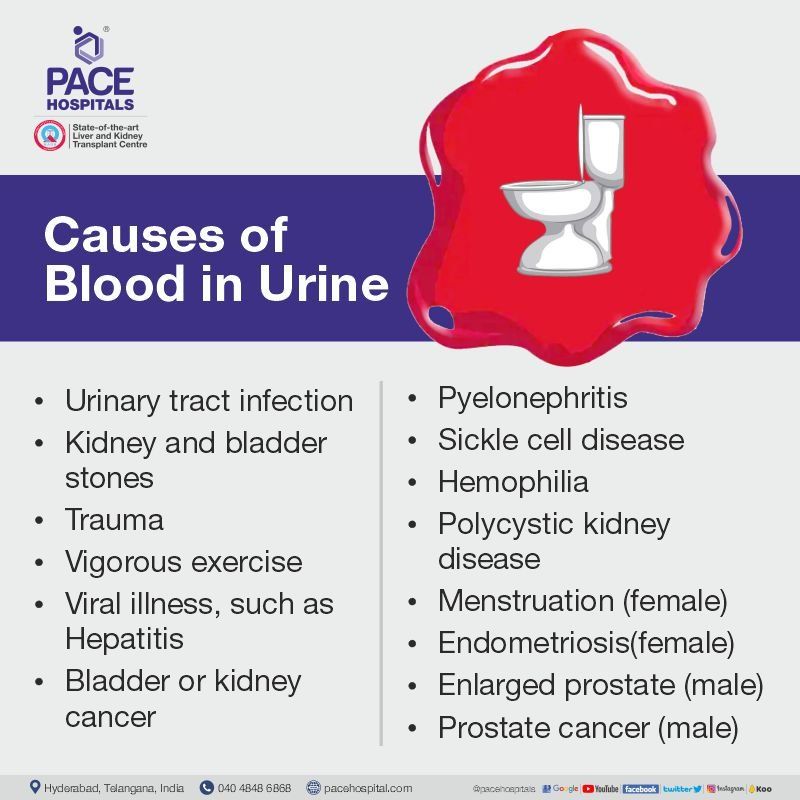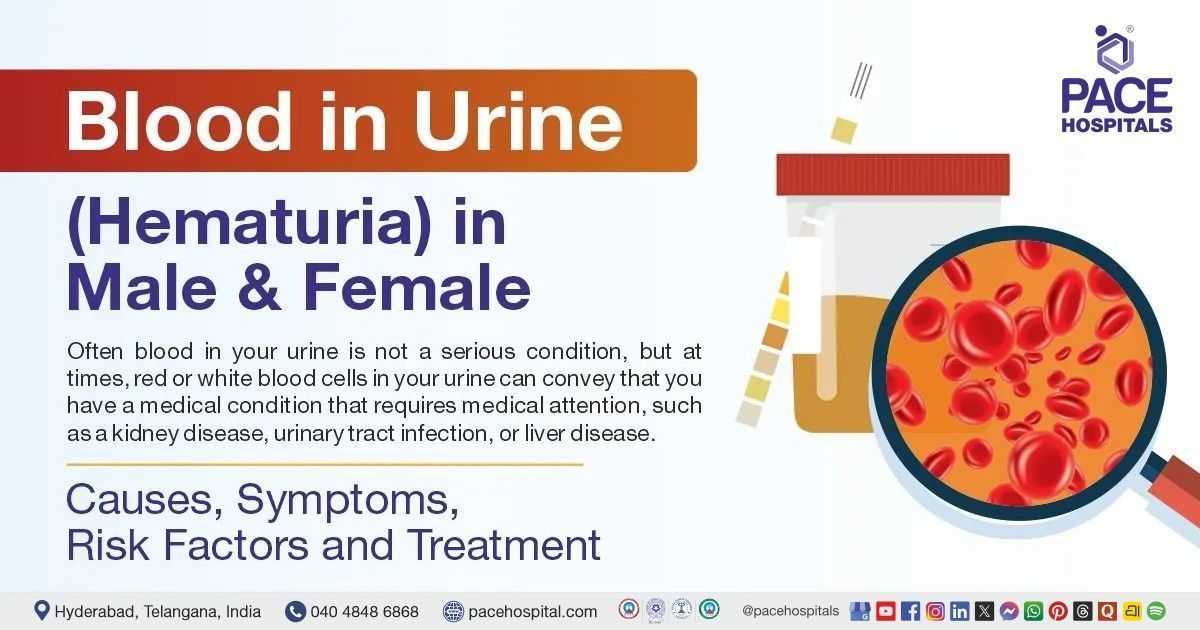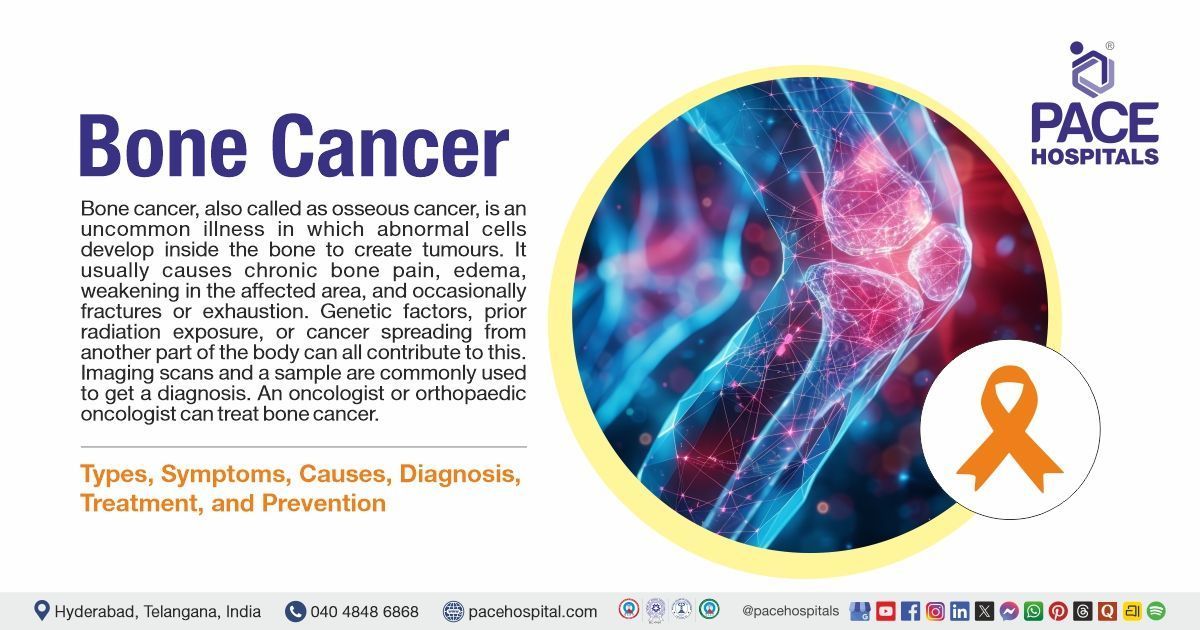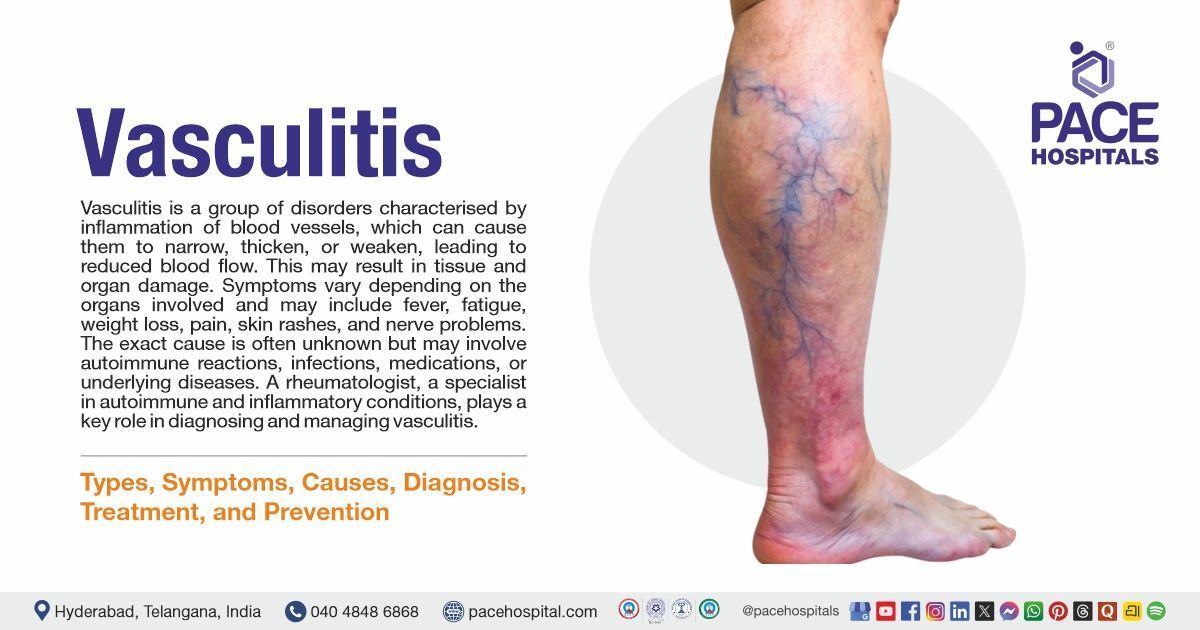Blood in urine (Hematuria) - Causes, Symptoms, Risk Factors and Treatment
PACE Hospitals
Blood in urine medical term - Hematuria
Blood in urine or Hematuria is not a serious condition, but at times, red or white blood cells in your urine can convey that you have a medical condition that requires medical attention, such as a kidney disease, urinary tract infection, or liver disease.
Blood in urine - sounds like a scary phenomenon, yet sometimes it’s not a cause for worry; still you shouldn’t ignore it because it can point towards a bigger underlying condition. Consult your primary care physician as he can prescribe you the tests to look for the cause.
Reasons for Blood in Urine in Male and Female
These are some of the reasons that can cause blood in urine in male and female both:
- Urinary tract infection- Infection manifests itself when bacteria move up the urethra, the tube that carries the urine outside the body from the bladder. The infection can move into the bladder and even into the kidneys. It often causes pain and a need to urinate frequently.
- Bladder and kidney stones (nephrolithiasis) - Another reason for blood in the urine is the presence of stones in the bladder or kidney. The stones are crystals that appear from the minerals in your urine. They can develop within your kidneys or bladder.
- Injury to the urinary tract
- Viral illness such as hepatitis
- Pyelonephritis (UTI that has reached as far as the kidney)
- Kidney disease, such as polycystic kidney disease
- Sickle cell disease (sickle cell anaemia)
- Haemophilia - a rare blood-clotting disorder
- Bladder cancer (bladder carcinoma)
- Kidney cancer
- Exercise induced - Strenuous exercise, Injury, such as from sports or a blow to the kidneys can also cause blood to be visible in the urine.
- Inflammation of the kidney, bladder, urethra, or prostate
- Medications- Certain medications can cause blood in urine. Like penicillin and aspirin.
- Recent catheterization
Apart from above, there are some specific reasons that are different in male and female
Specific reasons of blood in urine related to female
- Menstruation
- Endometriosis—a problem in women that occurs when the kind of tissue that normally lines the uterus grows somewhere else, such as the bladder
Specific reasons of blood in urine related to male
- Enlarged prostate (benign prostatic hyperplasia) - usually in middle age or older men
- Prostate cancer
Types of Hematuria
There are generally two types of Hematuria:
- Gross Hematuria
- Microscopic Hematuria
In Gross Hematuria person- can see the blood in his or her urine & the urine is overtly bloody, smoky, or tea colored, whereas in Microscopic Hematuria person can’t see the blood. Only a pathologist can see the blood through a microscope.
Symptoms of Blood in Urine (Hematuria)
Small amount of blood can cause change in the color of urine, sometimes people don’t have any symptoms apart from the color change in urine. These are some common symptoms of blood in urine:
- Red, pink or brown colored urine
- Blood clots in urine
- Pain in upper abdomen or pain in back

How are the Causes of Blood in Urine Diagnosed?
A general physician can diagnose blood in urine by getting your previous medical history with the help of these methods. In case nothing is found, a doctor may assess your level of risk for cancer.
- Physical examination such as digital rectal exam in men and pelvic exam in women to check for problems that may be causing blood in the urine.
- Urinalysis- A urinalysis encompasses examining the appearance, concentration and content of urine to determine and manage a wide range of ailments such as urinary tract infections, kidney disease and diabetes.
- Blood test - A blood test can indicate high levels of creatinine, a waste product of normal muscle breakdown, which may indicate kidney disease.
- Urine culture-A urine culture is a test to find germs (such as bacteria) in the urine that can cause an infection
- Kidney Biopsy - The biopsy can help in diagnosing if the blood in urine (Hematuria) is due to kidney disease.
- Urine cytology- Urine cytology is a test that looks for abnormal cells in urine under a microscope.
- Cystoscopy - Cystoscopy is endoscopy of the urinary bladder via the urethra.
- A CT urogram- It may be helpful in diagnosing urinary tract conditions such as: Kidney stones or bladder stones.
- Magnetic resonance imaging (MRI) - An MRI can help diagnose problems in the bladder or kidney.
When do I Need to See a Doctor?
Consult a general physician immediately if you have one or more of these symptoms:
- Nausea
- Vomiting
- Fever
- Chills
- Pain in your side, back, or abdomen
How Can I Prevent Blood in Urine?
Preventing Blood in urine means preventing the underlying causes:
- To prevent infections, drink plenty of water daily, urinate immediately after sexual intercourse, and practice good hygiene.
- To prevent stones, drink plenty of water and avoid excess salt and certain foods like spinach and rhubarb.
- To prevent bladder cancer, refrain from smoking, limit your exposure to chemicals, and drink plenty of water.
What are the Risk Factors for Blood in Urine?
Anyone including children can have blood in urine, these are some of the risk factors:
- Certain medications, such as blood thinners, aspirin and other pain relievers
- Strenuous or Vigorous exercise
- Have a bacterial or viral infection, such Hepatitis
- Family history of kidney disease
Treatment for Blood in Urine
Based on the conditions, a primary care physician may prescribe medicines to treat the underlying symptoms. Further, based on the diagnosis, if required, surgical treatment would be advised such as removal of kidney stones or bladder stones.
In some of the cases there is no treatment required. Further, it’s important for a person to follow up with a primary care physician to make sure there is no blood in urine.
Can Uterine Prolapse Cause Blood in Urine?
Yes, mucosal trauma caused by the prolapse may cause blood in urine.
When it might be something else?
It may not be blood in your urine if:
- You've recently eaten beetroot
- You're taking a new medicine
- You're bleeding from your bottom instead
- It's happening during your period
Are Blood Clots in Urine an Emergency?
Yes, if you are passing different-shaped clots in your stream, they could represent bleeding from the urethra in women or prostate in men. Clots can be wormlike, and if associated with pain it could represent clots coming from your ureters (tubes from your kidneys to your bladder).
Is Hematuria Dangerous?
No, Hematuria is not generally dangerous condition and can be treated by medical or surgical interventions. But it can point to a life- threatening underlying condition such as Kidney cancer, Prostate cancer, sickle cell disease etc. that require immediate medical attention.
What to Expect from a Doctor When Going for Appointment?
During doctor consultation, doctor might ask these questions. Providing detailed information will help in getting the best treatment for blood in urine.
- Do you feel pain while passing urine?
- Do you see blood while urinating sometimes or every time?
- When do you see blood in urine - starting of urination, ending of urination or throughout urination?
- Do you notice blood clots during urination?
- Do you smoke?
- Are you exposed to chemicals, if then what kind?
- Have you been through radiation therapy?
Is it Normal to have a Small Amount of Blood in Urine?
Blood in urine is called haematuria. It can be frightening but not life-threatening. If anyone notices blood in urine, don't ignore it because this condition may indicate underlying causes such as bladder infection, kidney infection, kidney stones, certain kidney diseases, enlargement of the prostate, vigorous exercise or injury. There is no single specific treatment for all cases of haematuria. Instead, treatment can be aimed at treating the underlying cause.
Frequently Asked Questions on Blood in Urine (Hematuria)
What does blood in urine indicate?
Blood in urine, medically known as hematuria, may signal an underlying issue anywhere in the urinary tract. While it can be caused by minor conditions, it may also indicate kidney, bladder, or prostate-related problems. A medical evaluation helps determine whether the cause is benign or requires treatment.
What are the most common causes of blood in urine?
Urinary tract infections, kidney stones, prostate enlargement, and kidney diseases are some of the most common causes. Blood in urine may be connected with more serious conditions such as kidney or bladder cancers, necessitating immediate diagnosis.
Can kidney stones cause blood in urine?
Yes. Kidney stones are a frequent cause of blood in urine, especially when stones move through the urinary tract. The sharp edges of stones can irritate or injure the lining of the urinary tract, leading to bleeding and pain.
How does an enlarged prostate lead to blood in urine?
An enlarged prostate can compress the urinary tract and cause irritation of surrounding blood vessels. This is the main reason behind blood appearing in urine, particularly it happens in older men or those with urinary obstruction symptoms.
Can blood in urine be linked to kidney cancer?
Yes. Kidney cancer can sometimes present with blood in urine, often without pain in the early stages. Persistent or unexplained hematuria should always be investigated through proper diagnostic tests to rule out any such malignant condition.
Can liver diseases like hepatitis affect urine color?
Certain liver disorders, such as hepatitis, can result in dark or discoloured urine due to release of bile pigments. Although this is not the same as real haematuria, laboratory tests and diagnostic evaluation reports can help to differentiate between blood and liver-related urine abnormalities.
When should blood in urine be considered serious?
Blood in the urine should be considered seriously if it is persistent, recurring, painless, or accompanied by weight loss, fever, or urinary difficulties. These characteristics may indicate a more serious underlying problem requiring specialized treatment and proper care.
How is the cause of hematuria diagnosed?
Diagnosis usually involves urine tests, blood investigations, imaging studies such as ultrasound or CT scan, and clinical evaluation. In certain cases, further procedures may be required to identify the exact cause.
Is blood in urine always visible to the naked eye?
No. Blood in urine can be either visible (gross hematuria) or detected only through laboratory testing (microscopic hematuria). Even when not visible, microscopic hematuria should not be ignored, as it may still point to an underlying condition.
Does blood in urine always indicate cancer?
No. While cancer is one possible cause, most cases of hematuria are related to non-cancerous conditions such as infections, stones, or prostate issues. However, medical evaluation is essential to exclude serious causes leading to blood in urine.
When is a kidney biopsy recommended for hematuria?
When hematuria is considered to be caused by renal tissue and normal testing are inconclusive, a kidney biopsy may be recommended. It aids in the identification of specific kidney problems and the development of customized treatment strategies.
Can blood in urine occur without pain?
Yes. Painless hematuria can occur in conditions such as kidney tumors, bladder disorders, or early-stage kidney disease. Painless blood in urine should never be ignored and requires thorough evaluation.
Are urinary tract infections a cause of blood in urine?
Yes. Infections can inflame the lining of the bladder or kidneys, leading to blood in urine. Symptoms often include burning during urination, fever, or frequent urination.
How does PACE Hospitals evaluate patients with blood in urine (hematuria)?
At PACE Hospitals, evaluation of hematuria follows a structured and thorough integrated approach:
- Detailed clinical assessment by urologists and nephrologists
- Comprehensive urine and blood investigations to identify the source of bleeding
- Advanced imaging studies to assess kidneys, bladder, and prostate
- Timely identification of conditions such as kidney stones, prostate enlargement, or tumors
- Personalized diagnostic planning to ensure accurate and early diagnosis
Is blood in urine common in older adults?
Hematuria becomes more common with age due to prostate enlargement, stone disease, or age-related kidney changes. Regular screening and early evaluation are especially important in older individuals.
When should someone consult PACE Hospitals for blood in urine?
Medical consultation at PACE Hospitals is advised under the following situations:
- Blood in urine persists or recurs over time
- Hematuria occurs without pain or obvious infection
- Associated symptoms such as difficulty urinating, fever, or weight loss are present
- There is a history of kidney stones, prostate problems, or smoking
- Early evaluation is needed to rule out serious causes like kidney or bladder cancer
Does PACE Hospitals manage both medical and surgical causes of hematuria?
Yes, PACE Hospitals provides complete care for both medical and surgical conditions causing hematuria:
- Medical management for infections, kidney inflammation, and metabolic disorders
- Specialized treatment for kidney stones using minimally invasive procedures
- Expert care for enlarged prostate causing urinary obstruction
- Advanced surgical and oncological care for kidney and bladder cancers
- Coordinated follow-up to prevent recurrence and complications
When is a kidney biopsy advised at PACE Hospitals for hematuria?
A kidney biopsy is recommended at PACE Hospitals only after careful observation and proper evaluation:
- When routine tests do not clearly identify the exact cause of hematuria
- If kidney-related disease is suspected at the tissue level
- To confirm specific kidney disorders before starting targeted treatment
- When precise diagnosis is essential for long-term kidney preservation
- Performed with strict safety protocols and expert supervision
Why choose PACE Hospitals for evaluation and treatment of blood in urine?
PACE Hospitals offers a patient-centered and expert-driven specialists treatment approach:
- Multidisciplinary teams involving highly experienced urologists, nephrologists, and interventional radiologists
- Advanced diagnostic facilities under one roof
- Evidence-based treatment plans tailored to individual needs
- Focus on early detection, accurate diagnosis, and long-term care
- Trusted expertise in managing complex urinary and kidney conditions
Share on
Request an appointment
Fill in the appointment form or call us instantly to book a confirmed appointment with our super specialist at 04048486868











